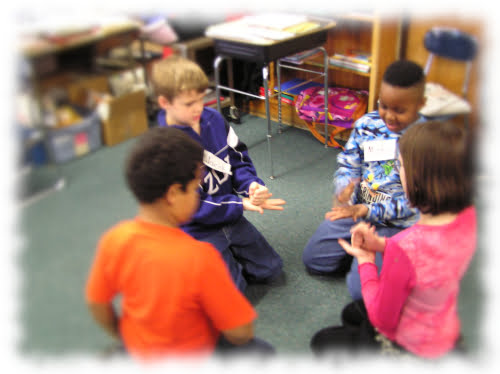I recently had a question posed by Abbey in Maryland, who wanted to know more about negotiation strategies. I am including her question and my answer here in hopes that it will give others more insight into these strategies. You might want to reference the “Concentration and Partner Work” lesson in the Getting Started With Drama sequence on the OneStopDRAMAShop for additional context on this topic. We encourage you to keep sending us your ideas and thoughts on this or any topic. None of us are as smart as all of us, so jump in there and share what you know relating to each question presented.
Hello [Karen], I am doing Concentration and Partner Work lesson. I'm supposed to explain the three beginning negotiation strategies which are:
a. Chance
b. Taking Turns
c. "I Don't Care."There is no explanation on each of the said strategies. What are the expectations for each? Kindly elaborate. Or is there a place on the website that explains in depth about negotiation strategies that you can refer me to?
Hello Abbey,
Nice to hear from you. I hope you are doing well and that your year is off to a great start. I will do my best to answer your question about negotiation strategies.
CHANCE. (This is any type of chance.) When teachers say, "If you wore red today, line up first," this is an example of chance as it was by chance you wore red today. "Bubble gum bubble gum in a dish" or "Eenee, Meenee, Minee, Mo" are both examples of games of chance. Picking a number between 1-5 or drawing a name out of a hat are also ways to take a chance. Students like to play "Rock Paper Scissors," but this is one game of chance I won't allow as many students know how to cheat. I learned this early in my career, as I stood over groups of second graders using “Rock Paper Scissors” to make a decision and saw them cheating at this game. If all this seems strange, just ask your class how many know that people can cheat at this game. Also ask how many don’t know. They will tell you.
The absolute best strategy for chance is called "Odds and Evens." It is quick, fair, and I haven't witnessed any cheating. In this game, each partner puts one hand behind their back, each partner selects either odd or even, then on a count of three they reveal any number of fingers from behind their back from zero to 5. The two partners add the fingers together...if it’s an odd number, odd wins; if it’s an even number, even wins. This is a very quick decision making game of chance. In a group of 5-6 students who all want to play the same role, they move quickly around the circle as individuals play games of odds and evens with each other to reach the final outcome.
I tell the class,
"When you play a game of chance with someone there will be a winner and one or more losers. You have a 50/50 chance of losing. If you decide to play a game of chance...you must cooperate by going along with the final decision.
- First you ask each other what role or task everyone would like…everyone says their answer.
- Second, the team chooses “chance” as a way to negotiate – all must agree
- Third, team decides which strategy to use, (names in a hat, odds/evens, etc.)
- Fourth, team executes the strategy,
- Fifth, everyone COOPERATES by going along with the outcome. (e.g. no quitting, pouting, etc...)
If they don't want to "go along with the outcome" then they must choose another negotiation strategy like....
TAKING TURNS. “Taking Turns” means everyone who wants to do a certain role or task gets to switch off and play the role or do the task...back and forth, back and forth. I often see “Taking Turns” turn into “Sharing a Role,” where a one headed dragon becomes a multi-headed dragon, and the heads take turns speaking the lines.
Important note: When taking turns, if the team can't decide who goes in which order...they might play odds and evens - take a chance to decide. I remind them that it won't matter who wins or loses because everyone gets to do it! This comes up very rarely, so I never mention it if they don’t! Better to address it when and if it happens. In all my years it has only happened 3-4 times ever.
Now, there is an even faster way to decide:
I DON'T CARE. I say to them, “If you don’t care and you’ll do anything, just say, ‘I don’t care.’ It is fast and gets you into practicing quickly. However…
Three rules about this.
First, don't say you don't care if you do. If you do care, take a chance or decide to take turns.
Second, don't begin the negotiation by saying you don't care. Begin by asking each other or everyone in a group what they would like to do. Everyone must say what they would like to do. If several people want to take the same role or do the same task, only then can you or someone else say, ‘I don't care, I’ll be __________.’”
Important note: This is because some students will give in to the status of other students and just say, "I Don't Care" when they are teamed up with someone that intimidates them or someone they admire. Everyone voicing what they want to do or what role they want at the start of negotiations means all students have a voice in drama and in the classroom.
Third, if everyone still cares after "the asking," return to the first two strategies - take a chance or take turns.
The hardest part is supporting and encouraging the students to continue using the strategies as they work in groups throughout their time with you. These strategies provide a safe and collaborative classroom where making decisions both in drama and in other areas harmonious. I hope you find this helpful! This process works at all grade levels and in life.
by Karen Erickson


